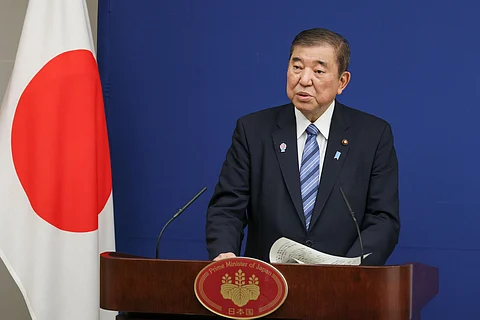

Japan marked the 80th anniversary of its World War II surrender on August 15, 2025, with solemn ceremonies honoring over 3 million war dead.
The milestone comes as concerns grow over fading memories of the war’s tragedies and the lessons of Japan’s militaristic past.
Prime Minister Shigeru Ishiba, speaking at a national ceremony in Tokyo’s Budokan hall, expressed “remorse” for the war, a term not used by a Japanese leader in an August 15 address since 2013.
He emphasized a commitment to peace, stating, “We will never repeat the tragedy of the war. We will never go the wrong way.”
The event saw 4,500 attendees, including bereaved families, observe a moment of silence at noon, the time of Emperor Hirohito’s 1945 surrender broadcast.
The Budokan ceremony included offerings of chrysanthemum flowers for the war dead, with Emperor Naruhito expressing “deep remorse” and a hope that “the ravages of war will never be repeated.”
Meanwhile, the nearby Yasukuni Shrine, which honors 2.5 million war dead, including convicted war criminals, drew dozens of rightwing politicians, including Agriculture Minister Shinjiro Koizumi.
He defended his visit, saying, “It is important to not forget those who sacrificed their lives for their country.”
The shrine remains controversial, viewed by China and South Korea as a symbol of Japan’s unaddressed wartime aggression.
Ishiba avoided visiting Yasukuni, sending a religious ornament instead, a gesture reflecting the delicate balance between remembrance and regional sensitivities.
China and South Korea urged Japan to confront its wartime actions.
Chinese Foreign Minister Wang Yi criticized efforts to “whitewash and deny aggression,” while South Korean President Lee Jae Myung called for trust-building ahead of a summit with Ishiba.
In Japan, individuals like Hajime Eda, a bereaved family representative, stressed the need to pass down lessons of war’s futility and peace’s value.
Teenagers, such as 15-year-old Ami Tashiro from Hiroshima, participated in memorials to connect with their ancestors’ sacrifices.
As Japan’s wartime generation dwindles, the challenge of preserving an accurate historical narrative grows, especially amid revisionist efforts to downplay Japan’s wartime role.
With global tensions rising, Japan faces the task of educating younger generations about its past.
The Mainichi newspaper urged collaboration with Asian neighbors to promote a “world without war.”
Emperor Naruhito’s visits to wartime sites like Iwo Jima and Hiroshima underscore this commitment.
As Japan reflects on its history, the anniversary serves as a reminder to uphold peace and confront the complexities of its wartime legacy.